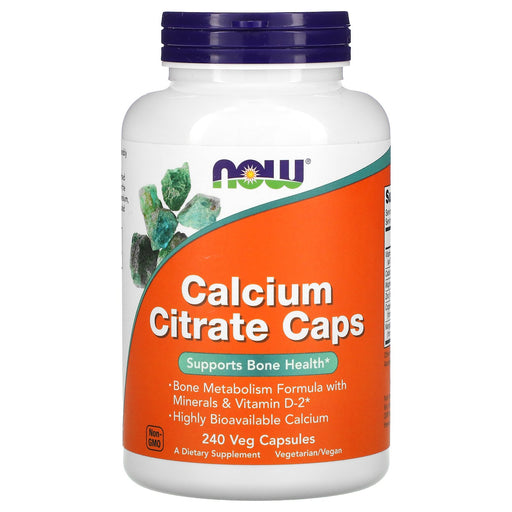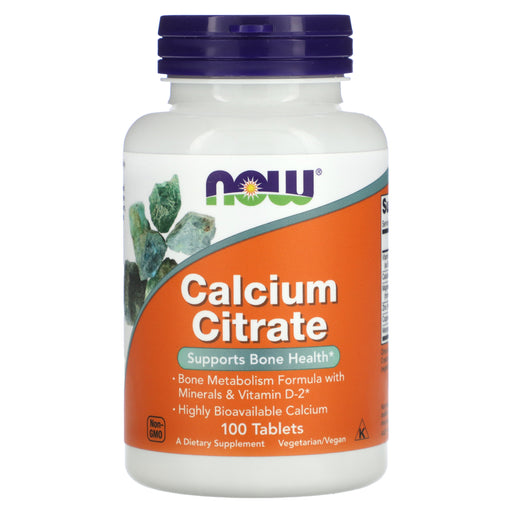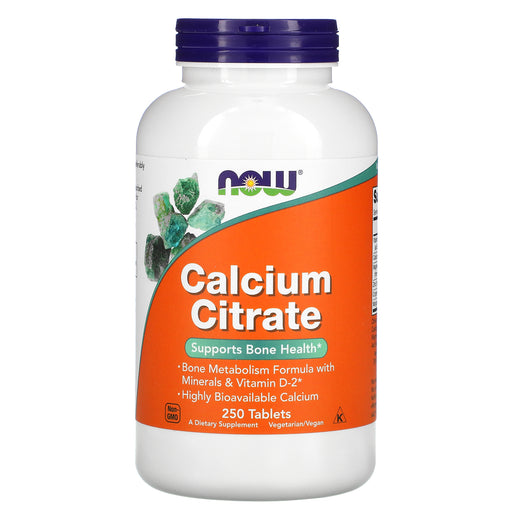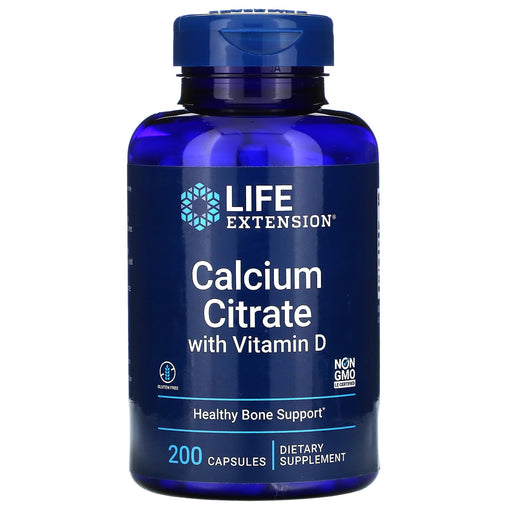
Optimize Your Bone Health with Highly Absorbable Calcium Citrate Supplements
Calcium is an essential mineral that plays a crucial role in building and maintaining strong bones, supporting muscle and nerve function, and promoting overall health and well-being. While there are many forms of calcium supplements available, calcium citrate stands out as a highly absorbable and easily tolerated option. At Health Orchard, we offer a carefully curated selection of premium calcium citrate supplements designed to help you optimize your calcium intake and support lifelong bone health.
Why Choose Calcium Citrate?
Calcium citrate is a form of calcium that is bound to citric acid, creating a highly bioavailable and easily absorbed supplement. Some of the key benefits of calcium citrate include:
- Superior Absorption: Calcium citrate is one of the most well-absorbed forms of calcium, with studies showing that it has a higher bioavailability compared to other forms like calcium carbonate. This means that your body can more easily absorb and utilize the calcium from these supplements, ensuring that you receive the maximum benefits for your bones and overall health.
- Gentle on the Digestive System: Calcium citrate is less likely to cause digestive discomfort or side effects compared to other forms of calcium. It does not require stomach acid for absorption, making it an ideal choice for individuals with lower stomach acid levels or those taking acid-blocking medications.
- Flexible Dosing: Calcium citrate supplements can be taken with or without food, providing greater flexibility in dosing and making it easier to incorporate into your daily routine. This is in contrast to calcium carbonate, which is best absorbed when taken with a meal.
- Supports Optimal Bone Health: By providing a highly absorbable form of calcium, calcium citrate supplements can help ensure that your body has an adequate supply of this essential mineral for building and maintaining strong, dense bones. This is particularly important for older adults, postmenopausal women, and those with a family history of osteoporosis.
- Promotes Overall Health: In addition to supporting bone health, calcium citrate supplements can also help promote healthy muscle and nerve function, support cardiovascular health, and maintain optimal hormone balance. Adequate calcium intake is essential for overall health and well-being throughout life.
Experience Health Orchard's Premium Selection of Calcium Citrate Supplements
At Health Orchard, we're committed to providing you with the highest-quality calcium citrate supplements to support your bone health and overall well-being. Our carefully selected products are formulated with optimal potency and purity in mind, ensuring that you receive the maximum benefits from each dose.
Some of our most popular calcium citrate supplements include:
- Pure Calcium Citrate: Our pure calcium citrate supplements provide a concentrated dose of this highly absorbable form of calcium, without any additional ingredients or fillers. These supplements are ideal for those who prefer a simple, straightforward approach to calcium supplementation.
- Calcium Citrate & Vitamin D: Our calcium citrate and vitamin D supplements provide a synergistic blend of these two essential nutrients, supporting optimal calcium absorption and utilization for strong, healthy bones. Vitamin D also plays a crucial role in immune function, mood regulation, and overall health.
- Calcium Citrate & Magnesium: Our calcium citrate and magnesium supplements offer a balanced ratio of these two essential minerals, which work together to support bone health, muscle function, and overall relaxation and well-being. Magnesium also helps regulate calcium metabolism and supports healthy nerve and heart function.
- Calcium Citrate with Boron and Vitamin K2: Our calcium citrate supplements with added boron and vitamin K2 offer a comprehensive bone health formula that supports optimal mineralization, strength, and flexibility. Boron and vitamin K2 work synergistically with calcium to enhance its effects and promote lifelong bone health.
- Calcium Citrate Powder: For those who prefer a versatile and customizable approach to calcium supplementation, our calcium citrate powder offers a convenient and easily mixable form of this essential mineral. The powder can be added to water, juice, or smoothies for a quick and easy way to boost your daily calcium intake.
How to Choose the Best Calcium Citrate Supplement for Your Needs
When selecting a calcium citrate supplement, it's important to consider your individual needs, preferences, and health status. Some factors to keep in mind include:
- Dosage and Serving Size: Pay attention to the dosage and serving size of your calcium citrate supplement, and choose a product that aligns with your individual needs and dietary preferences. Keep in mind that the body can only absorb about 500 mg of calcium at a time, so it's best to split larger doses throughout the day.
- Complementary Nutrients: Consider calcium citrate supplements that include other essential bone-supporting nutrients like vitamin D, magnesium, vitamin K2, and boron. These nutrients work synergistically with calcium to enhance its effects and promote optimal bone health.
- Quality and Purity: Choose calcium citrate supplements from reputable brands that prioritize quality, purity, and transparency. Look for products that are third-party tested for potency and purity, and free from harmful additives, fillers, or contaminants.
- Consultation with a Healthcare Provider: If you have a pre-existing health condition, are taking medications, or have concerns about your calcium intake, it's always best to consult with a qualified healthcare provider before starting a new supplement regimen. They can help you determine the most appropriate form and dosage of calcium for your individual needs.
Simple Tips for Maximizing the Benefits of Calcium Citrate Supplementation
To get the most out of your calcium citrate supplement, consider these simple tips:
- Split Your Dose: If you're taking a higher dose of calcium citrate, consider splitting it into smaller doses throughout the day. This can help maximize absorption and reduce the risk of digestive side effects.
- Pair with a Balanced Diet: While calcium citrate supplements can help fill dietary gaps, they should not be used as a substitute for a balanced diet rich in calcium-containing foods. Aim to include a variety of calcium-rich foods like dairy products, leafy greens, and fortified foods in your daily diet.
- Stay Hydrated: Adequate hydration is important for overall health and can help support optimal calcium absorption and utilization. Aim to drink plenty of water throughout the day, and limit your intake of caffeine and alcohol, which can interfere with calcium absorption.
- Engage in Regular Weight-Bearing Exercise: In addition to adequate calcium intake, regular weight-bearing exercise is essential for building and maintaining strong, healthy bones. Engage in activities like walking, jogging, dancing, or strength training for at least 30 minutes a day, most days of the week.
- Store Properly: To maintain the potency and freshness of your calcium citrate supplement, store it in a cool, dry place away from direct sunlight and moisture. Keep the container tightly closed and avoid exposing the supplements to extreme temperatures or humidity.
Experience the Life-Changing Benefits of Optimal Calcium Intake with Calcium Citrate
At Health Orchard, we're committed to providing you with the highest-quality, most effective calcium citrate supplements to support your bone health and overall well-being. Our carefully curated selection offers a range of options to suit your individual needs and preferences, from pure calcium citrate to synergistic blends with vitamin D and other essential nutrients.
Whether you're looking to support strong bones, reduce your risk of osteoporosis, or promote overall health and vitality, our premium calcium citrate supplements can help you achieve your goals. With our unwavering commitment to quality, transparency, and your success, you can trust Health Orchard to be your partner in optimal bone health.
Experience the life-changing benefits of optimal calcium intake with highly absorbable calcium citrate and witness the difference that targeted, high-quality supplementation can make in your overall health and well-being. Shop our collection today and take the first step towards fortifying your bones and supporting your lifelong health with the power of calcium citrate.
Frequently Asked Questions about Calcium Citrate
1. What is calcium citrate used for?
Calcium citrate is a widely used calcium supplement that is easily absorbed by the body. It is primarily used for:
- Preventing and treating calcium deficiency: Calcium citrate supplements can help individuals who have difficulty meeting their daily calcium needs through diet alone.
- Supporting bone health: Adequate calcium intake is essential for maintaining strong bones and preventing conditions like osteoporosis and fractures.
- Managing certain medical conditions: Calcium citrate may be used to treat conditions such as hypoparathyroidism, osteomalacia, and rickets, which can cause calcium imbalances in the body.
- Reducing the risk of preeclampsia: Some studies suggest that calcium supplementation, including calcium citrate, may help lower the risk of preeclampsia during pregnancy.
- Phosphate binder: Calcium citrate can be used as a phosphate binder in people with chronic kidney disease to help control high blood phosphorus levels.
2. Is it safe to take calcium citrate daily?
For most people, taking calcium citrate daily as directed is generally safe and can be an effective way to meet daily calcium requirements. The recommended daily allowance (RDA) for calcium varies by age and sex, but for adults, it typically ranges from 1,000 to 1,200 milligrams (mg) per day.
However, there are some precautions to consider:
- Interactions: Calcium citrate can interact with certain medications, such as antibiotics, bisphosphonates, and diuretics. If you are taking any medications, consult with your healthcare provider before starting daily calcium citrate supplementation.
- Medical conditions: People with certain health conditions, such as kidney disease or a history of kidney stones, should be cautious when taking calcium citrate daily and should only do so under the guidance of a healthcare provider.
If you have any concerns about the safety of taking calcium citrate daily, consult with your healthcare provider for personalized advice and guidance.
3. What is the difference between calcium citrate and regular calcium?
The main difference between calcium citrate and "regular calcium" (which typically refers to calcium carbonate) lies in their chemical composition and absorption characteristics:
- Calcium citrate: This form of calcium is bound to citric acid, which enhances its solubility and absorption in the body. Calcium citrate does not require stomach acid for absorption, making it a good option for people with low stomach acid levels or those taking acid-reducing medications.
- Calcium carbonate: This is the most common and least expensive form of calcium supplement. It is bound to carbonate and requires an acidic environment for optimal absorption. Calcium carbonate is best taken with meals to maximize absorption and minimize digestive side effects.
Ultimately, the choice between calcium citrate and calcium carbonate depends on individual factors, such as absorption needs, tolerance, and cost. Consult with your healthcare provider to determine which form of calcium supplement is best for you.
4. Can calcium citrate cause kidney stones?
While calcium citrate supplementation is generally not associated with an increased risk of kidney stones, excessive calcium intake from any source can contribute to kidney stone formation in susceptible individuals. However, calcium citrate may actually help prevent certain types of kidney stones.
Here's what you need to know:
- Calcium oxalate stones: Calcium citrate can help reduce the risk of calcium oxalate stones, the most common type of kidney stone, by binding to oxalate in the digestive tract and preventing its absorption.
- Calcium phosphate stones: In some cases, excessive calcium intake, particularly from supplements, can increase the risk of calcium phosphate stones. However, this risk is more commonly associated with calcium carbonate supplements rather than calcium citrate.
- Importance of hydration: Staying well-hydrated is crucial for preventing kidney stones, regardless of calcium intake. Aim to drink enough water to produce clear or light yellow urine.
5. Does calcium citrate affect the kidneys?
Calcium citrate can affect the kidneys in both positive and negative ways, depending on the individual and the dosage:
Positive effects:
- Preventing kidney stones: Calcium citrate may help reduce the risk of calcium oxalate kidney stones by binding to oxalate in the digestive tract and preventing its absorption.
- Supporting bone health: Adequate calcium intake is essential for maintaining strong bones, which can help prevent conditions like osteoporosis that can increase the risk of kidney stones due to immobilization.
Negative effects:
- Excess calcium intake: Consuming too much calcium from supplements, including calcium citrate, can lead to hypercalcemia (high blood calcium levels) and hypercalciuria (high urinary calcium levels), which can contribute to the formation of calcium phosphate kidney stones and potentially impair kidney function.
- Interactions with medications: Calcium citrate can interact with certain medications, such as thiazide diuretics, which can increase the risk of hypercalcemia and kidney stones.
It's important to follow the recommended dosage of calcium citrate and to consult with your healthcare provider if you have a history of kidney problems or are taking medications that may interact with calcium supplements. Regular monitoring of kidney function and urinary calcium levels may be necessary for some individuals.
6. How does calcium citrate affect the kidneys?
Calcium citrate can affect the kidneys in several ways:
- Preventing calcium oxalate stones: Calcium citrate can bind to oxalate in the digestive tract, reducing its absorption and lowering the risk of calcium oxalate kidney stones.
- Increasing urinary citrate: Citrate is a natural inhibitor of kidney stone formation. When calcium citrate is metabolized in the body, it releases citrate, which can help prevent the formation of calcium-based kidney stones.
- Regulating calcium balance: The kidneys play a crucial role in maintaining calcium homeostasis in the body. When calcium intake is too high, the kidneys must work harder to filter out excess calcium, which can lead to hypercalciuria (high urinary calcium levels) and potentially contribute to kidney stone formation.
To minimize the potential negative effects of calcium citrate on the kidneys, it's essential to follow the recommended dosage, stay well-hydrated, and consult with your healthcare provider if you have a history of kidney problems or are taking medications that may interact with calcium supplements
7. What happens when you take calcium citrate?
When you take calcium citrate, several things happen in your body:
- Absorption: Calcium citrate is easily absorbed in the intestines, even in the absence of stomach acid. This makes it a good option for people with low stomach acid levels or those taking acid-reducing medications.
- Increased blood calcium levels: Once absorbed, calcium enters the bloodstream, increasing serum calcium levels. This is important for maintaining various bodily functions, such as muscle contraction, nerve signaling, and blood clotting.
- Bone health support: Calcium is a major component of bones, and adequate intake is essential for maintaining strong bones and preventing conditions like osteoporosis. When calcium levels in the blood are sufficient, the body can effectively mineralize and maintain bone tissue.
- Excretion of excess calcium: If calcium intake exceeds the body's needs, the kidneys filter out the excess calcium, which is then excreted in the urine. This process helps maintain calcium homeostasis in the body.


















